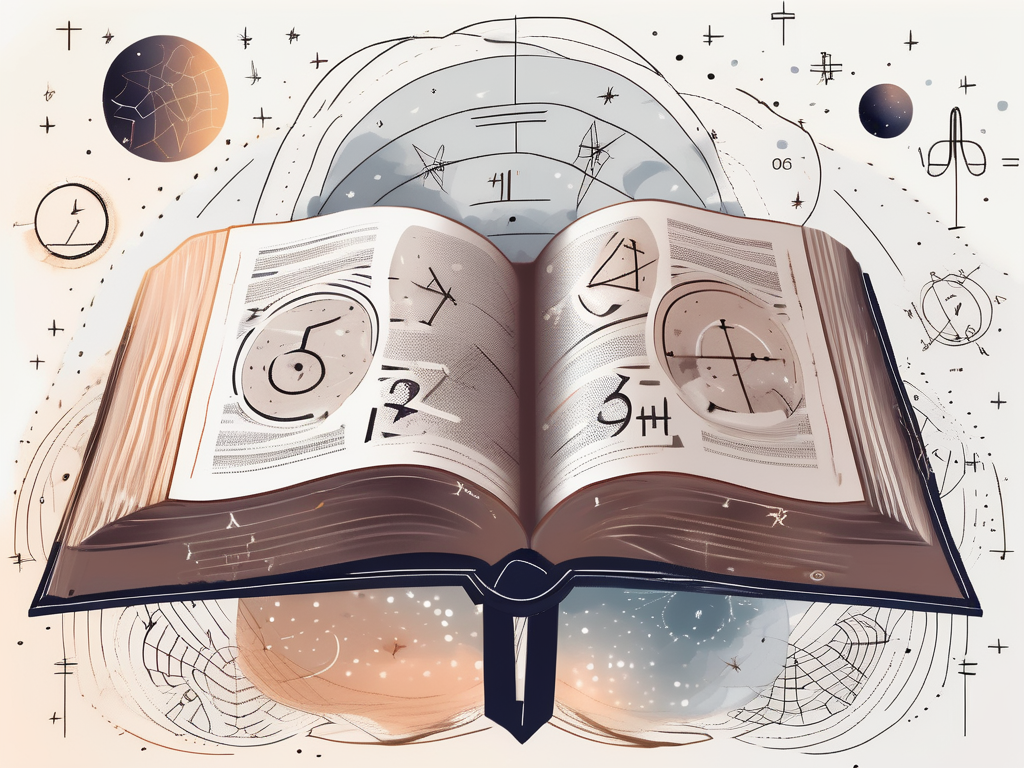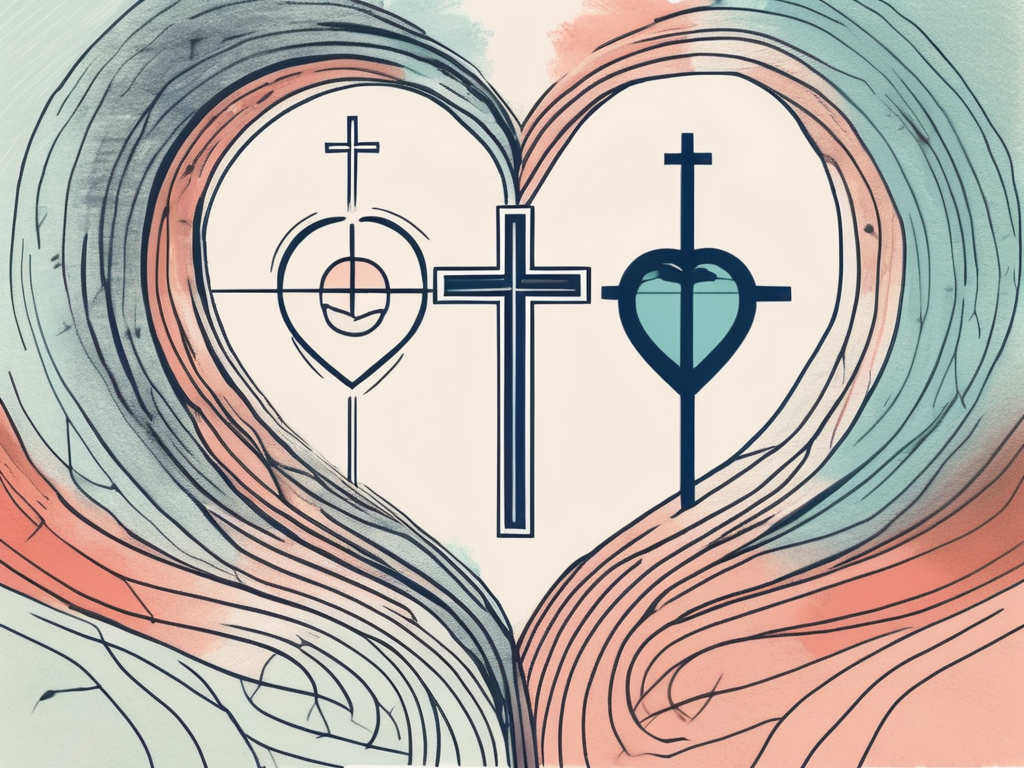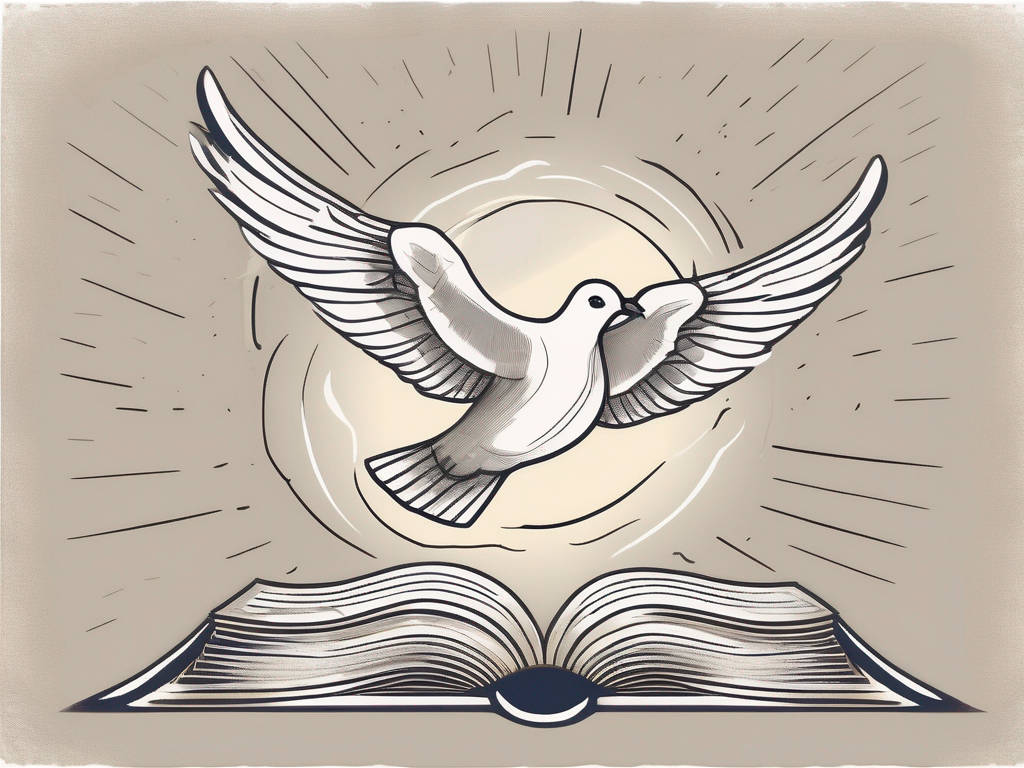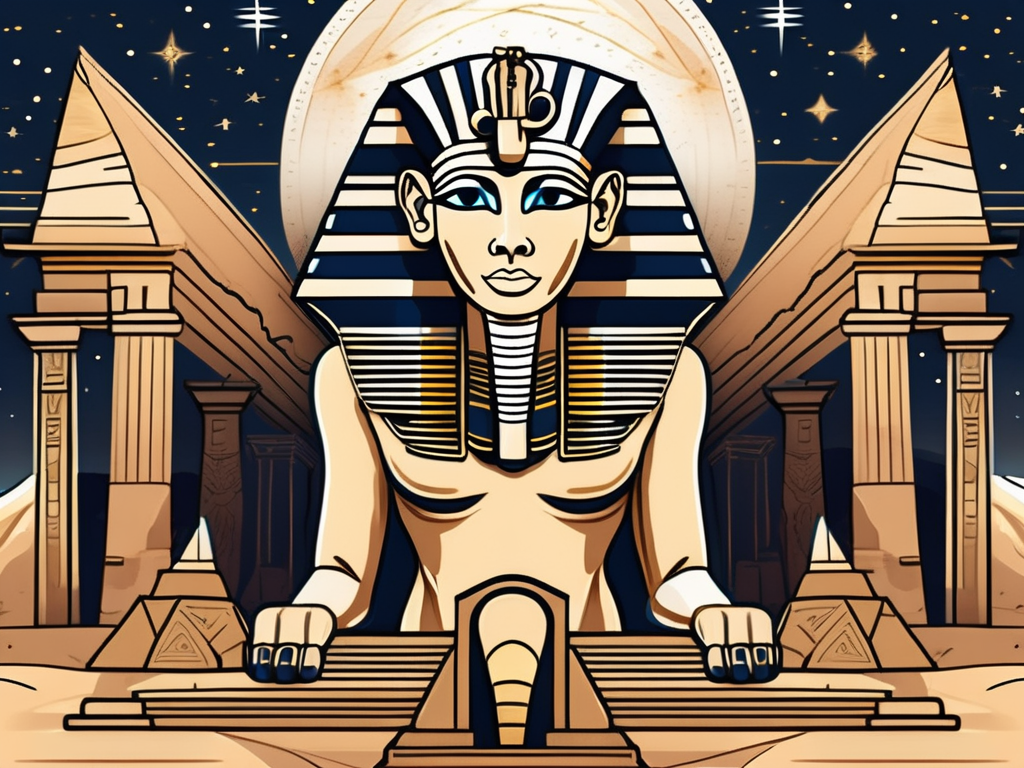Have you ever wondered why the number 3 is so prominent in the Bible? It seems to appear time and time again, weaving its way into the fabric of biblical texts and prophecies. In this article, we will dive deep into the symbolic significance of the number 3 in the Bible, unraveling its hidden meanings and shedding light on its profound role.
Understanding the Concept of Numerology in the Bible
Before we explore the significance of the number 3, it’s important to understand the concept of numerology in the Bible. Numerology is the study of numbers and their significance, particularly in relation to divine messages and spiritual meanings. In the Bible, numbers are often used symbolically and carry great depth of meaning.
When we delve into the world of numerology in the Bible, we discover a fascinating realm where numbers become more than just numerical values. They take on a spiritual essence, serving as a language through which divine messages are conveyed. Just as words have meaning, biblical numbers also have profound significance.
The Role of Numbers in Biblical Texts
Numbers hold a special place in biblical texts and are used to convey divine messages and spiritual truths. They serve as a form of symbolic language that reveals deeper meanings beyond their numerical value. Each number carries its own unique symbolism, adding layers of depth to the biblical narrative.
For example, the number 7 is often associated with completeness and perfection. It is the number of days in the creation story, representing the divine work of God. The number 40 is a symbol of testing and preparation, as seen in the forty days and nights of rain during the Great Flood and Jesus’ forty days of fasting in the wilderness.
Furthermore, the number 12 holds great significance in biblical numerology. It represents divine governance and authority, as seen in the twelve tribes of Israel and the twelve apostles chosen by Jesus. The number 12 symbolizes completeness and divine order.
The Significance of the Number 3 in General Numerology
In general numerology, the number 3 represents completeness, wholeness, and divine perfection. It is often associated with the Trinity, which comprises the Father, the Son, and the Holy Spirit. The number 3 is a powerful symbol of harmony and divine unity.
When we encounter the number 3 in the Bible, we are reminded of the divine nature of God and the interconnectedness of the Trinity. It serves as a reminder of the perfect union between the three persons of the Godhead, each working in harmony to fulfill the divine plan.
Throughout the Bible, we find numerous instances where the number 3 holds significant meaning. For example, Jesus’ ministry lasted for three years, symbolizing the completeness of His earthly mission. Additionally, Peter denied Jesus three times before the rooster crowed, highlighting the significance of repentance and forgiveness.
Furthermore, the number 3 is often associated with resurrection and new life. Just as Jesus rose from the dead on the third day, the number 3 represents the triumph over death and the promise of eternal life.
As we explore the concept of numerology in the Bible, we begin to see the intricate web of symbolism and meaning woven into the biblical narrative. Numbers are not mere mathematical figures, but rather gateways to deeper spiritual truths. Each number carries its own unique significance, inviting us to delve deeper into the mysteries of God’s divine plan.
The Number 3 in the Old Testament
In the Old Testament, the number 3 appears in various contexts, shedding light on its significance in biblical narratives and teachings.
As we delve deeper into the biblical texts, we find that the number 3 holds a profound symbolic meaning. It represents completeness, divine perfection, and the manifestation of God’s power. Let us explore some examples of how the number 3 is intricately woven into the fabric of the Old Testament.
The Trinity in Genesis
Genesis, the first book of the Bible, introduces the concept of the Trinity through the story of creation. God is depicted as speaking things into existence in three stages: the heavens, the earth, and all living creatures. This triadic pattern sets the stage for the symbolic significance of the number 3 throughout the Old Testament.
When God created the heavens, He established a realm where His glory and majesty would be displayed. The earth, the second stage of creation, became the dwelling place for humanity, a testament to God’s love and provision. Finally, the creation of all living creatures completed the divine work, showcasing the intricate beauty and diversity of God’s design.
This trinitarian pattern in Genesis not only emphasizes the power and creativity of God but also foreshadows the future revelation of the Holy Trinity in the New Testament.
The Three Patriarchs: Abraham, Isaac, and Jacob
Abraham, Isaac, and Jacob are known as the three patriarchs of Israel. They represent a lineage of God’s chosen people and play a significant role in biblical history. The number 3 is intimately tied to their stories, highlighting the importance of their faith and the fulfillment of God’s promises.
Abraham, the father of many nations, received three divine visitations from God. These encounters marked crucial moments in Abraham’s life, including the promise of a son in his old age and the establishment of the covenant between God and his descendants.
Isaac, the son of Abraham, also experienced the divine intervention of God in three significant events. From the miraculous birth of Isaac to the binding on Mount Moriah, where God tested Abraham’s faith, the number 3 is a constant reminder of God’s faithfulness and providence.
Jacob, the grandson of Abraham, encountered God in three transformative encounters. The first was the dream of a ladder reaching heaven, where God promised to bless Jacob and his descendants. The second was the wrestling match with the angel, which resulted in Jacob’s name being changed to Israel. Finally, the reconciliation with his brother Esau marked a turning point in Jacob’s life, symbolizing the restoration and redemption brought about by God’s grace.
These three patriarchs, with their unique experiences and encounters with God, exemplify the significance of the number 3 in the Old Testament. Their stories serve as a testament to the faithfulness of God and His sovereign plan for His people.
As we continue to explore the Old Testament, we will discover more instances where the number 3 plays a vital role in conveying spiritual truths and divine revelations. The intricate tapestry of biblical narratives and teachings is enriched by the symbolism and significance of this sacred number.
The Number 3 in the New Testament
In the New Testament, the number 3 continues to hold great significance, especially in relation to the life of Jesus Christ.
Throughout the scriptures, the number 3 is used to convey a sense of completeness and divine perfection. It is a number that represents harmony and unity, symbolizing the Holy Trinity – the Father, the Son, and the Holy Spirit.
One of the most well-known instances of the number 3 in the New Testament is found in the story of the three wise men who followed the star to find the baby Jesus. These wise men, also known as the Magi, were guided by the star of Bethlehem, which led them to the birthplace of Jesus. The number 3 in this context represents the convergence of wisdom, faith, and divine guidance. It underscores the significance of Jesus’s birth and the fulfillment of Old Testament prophecies.
Furthermore, the number 3 is prominently featured in Jesus’s ministry and teachings. He often spoke in triads, using three examples or parables to convey his message. This repetition of the number 3 served to emphasize his teachings and make them memorable to his followers.
The Three Wise Men and the Star of Bethlehem
The story of the three wise men who followed the star to find the baby Jesus is a well-known tale. These wise men, also known as the Magi, were scholars and astrologers who studied the heavens for signs and prophecies. When they saw a new star appear in the sky, they recognized it as a sign of the birth of a great king. Guided by their knowledge and faith, they embarked on a long journey to find the newborn king.
The number 3 in this story represents not only the three wise men but also the convergence of wisdom, faith, and divine guidance. Each wise man brought a gift to honor the baby Jesus – gold, frankincense, and myrrh. These gifts symbolize Jesus’s kingship, divinity, and eventual sacrifice. The number 3, therefore, underscores the significance of Jesus’s birth and the fulfillment of Old Testament prophecies.
The Resurrection on the Third Day
Perhaps one of the most profound instances of the number 3 in the New Testament is Jesus’s resurrection. According to the Gospels, Jesus was crucified and buried, and on the third day, he rose from the dead. This miraculous event signifies the ultimate triumph over sin and death, offering hope and salvation to all who believe.
The number 3 in this context exemplifies divine power and transformation. It represents the completeness of God’s plan of redemption and the fulfillment of Old Testament prophecies. Jesus’s resurrection on the third day is a testament to his divine nature and the power of God’s love.
In conclusion, the number 3 holds great significance in the New Testament, particularly in relation to the life of Jesus Christ. It symbolizes harmony, unity, and divine perfection. From the story of the three wise men to Jesus’s resurrection on the third day, the number 3 underscores the fulfillment of prophecies and the transformative power of God’s love and grace.
Theological Interpretations of the Number 3
The number 3 holds deep theological significance in Christianity, representing the triune nature of God and the foundations of faith.
When delving into the theological interpretations of the number 3, one cannot ignore the profound significance of the Holy Trinity. At the core of Christian belief, the Holy Trinity consists of three persons in one God: the Father, the Son, and the Holy Spirit. This divine relationship is beautifully encapsulated by the number 3, serving as a powerful reminder of the unity and complexity of God’s nature.
Each person of the Holy Trinity plays a distinct role in the Christian faith. The Father is the creator and sustainer of the universe, the Son is the savior who sacrificed himself for the redemption of humanity, and the Holy Spirit is the guide and comforter who dwells within believers. The number 3, therefore, not only represents the triune nature of God but also embodies the multifaceted aspects of divine presence in the lives of believers.
The Holy Trinity: Father, Son, and Holy Spirit
The Holy Trinity, with its three distinct persons, is a concept that has fascinated theologians and believers for centuries. The number 3 serves as a constant reminder of this divine relationship and the intricate interplay between the Father, the Son, and the Holy Spirit.
Throughout history, theologians have grappled with the mystery of the Holy Trinity, seeking to understand and explain this complex aspect of God’s nature. From the early Church Fathers to modern-day scholars, various theological frameworks have been developed to shed light on the significance of the Holy Trinity. The number 3 acts as a symbolic anchor for these discussions, providing a tangible representation of the divine unity and diversity found within the Godhead.
Faith, Hope, and Love: The Three Theological Virtues
Within Christian teachings, the number 3 is associated with the three theological virtues: faith, hope, and love. These virtues are considered foundational in the pursuit of a righteous and fulfilling life. The number 3, in this context, encapsulates the essence of these virtues and their transformative power.
Faith, the first of the theological virtues, is the firm belief and trust in God’s promises. It is through faith that believers are able to establish a personal relationship with God and find solace in His presence. Hope, the second virtue, is the confident expectation of eternal life and the fulfillment of God’s promises. It is hope that sustains believers in times of trials and tribulations, reminding them of the ultimate victory that awaits them. Lastly, love, the greatest of the theological virtues, is the selfless and unconditional love that believers are called to demonstrate towards God and their fellow human beings.
The number 3, with its inherent symbolism of unity and completeness, beautifully captures the interconnectedness of these virtues. Faith, hope, and love are intertwined, each nurturing and reinforcing the others. Together, they form a solid foundation for a life of spiritual growth and fulfillment.
The Number 3 in Biblical Prophecies
Biblical prophecies often incorporate the number 3, conveying important messages and warnings.
The Threefold Message of Revelation
The book of Revelation contains a threefold message for humanity: repentance, faithfulness, and hope. The number 3 emphasizes the urgency of these messages and serves as a call to action for believers to align their lives with God’s will.
The Three Woes in the Book of Revelation
In the book of Revelation, three woes are pronounced upon the earth, symbolizing the severity of God’s judgment. The number 3 underscores the gravity of these events, serving as a reminder of the consequences that await those who reject God’s grace and mercy.
In conclusion, the number 3 holds deep symbolic meaning in the Bible. From the Trinity to the pivotal events in the life of Jesus, and the foundational virtues of faith, hope, and love, the number 3 weaves a tapestry of divine significance throughout biblical texts and prophecies. As we delve deeper into the study of numerology in the Bible, let us not overlook the profound role that the number 3 plays in unveiling the intricate beauty of God’s Word.












